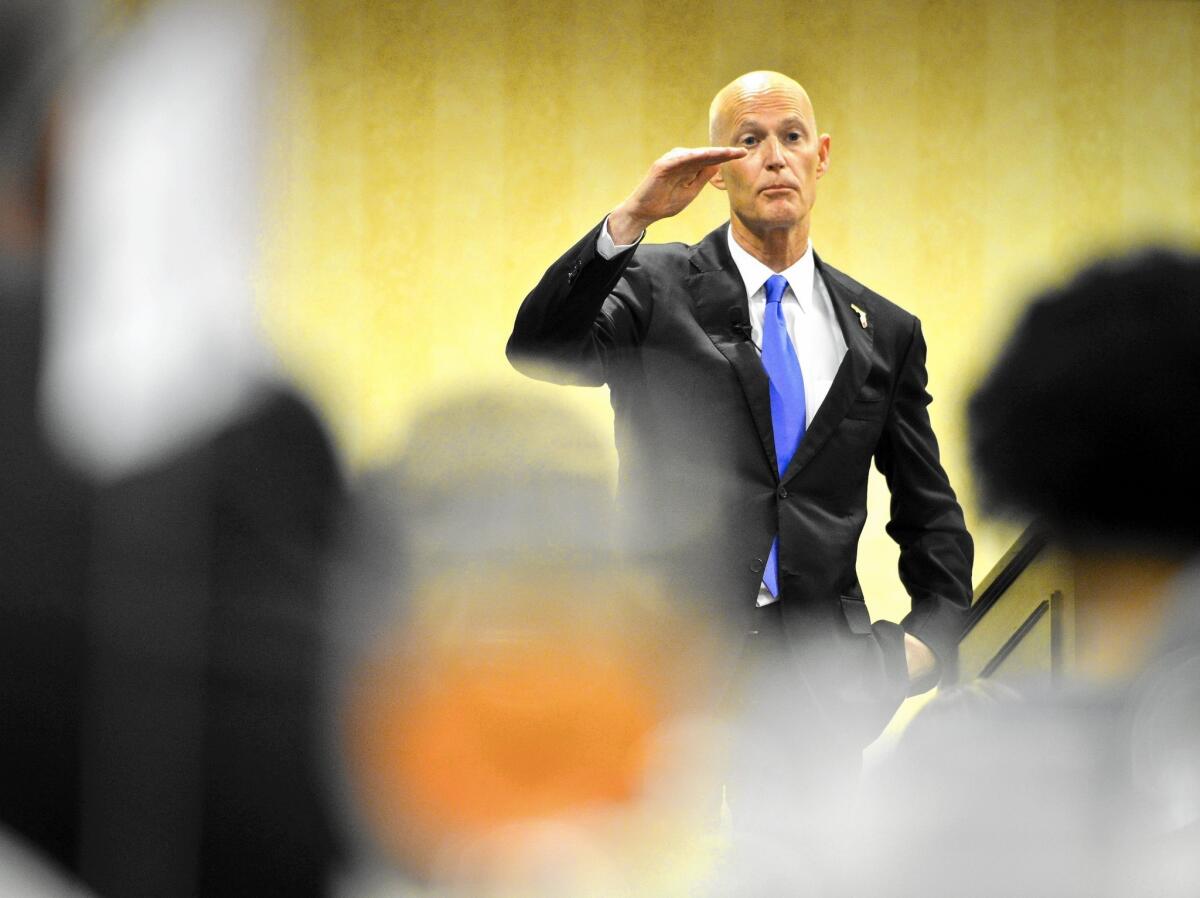Florida governor pursues California firms despite few interstate moves

- Share via
Florida Gov. Rick Scott is the latest out-of-state politician on a job-stealing tour of California, bashing the state’s taxes and business regulation.
Scott breezed into Los Angeles on Monday preaching the old-time gospel of hands-off government. He promised that Florida’s rejuvenated seaports are poised to take business from Southern California’s global trade hubs following recent union contract disputes.
California, of course, is an alluring target for job poachers — the state is tied with New York for the nation’s most Fortune 500 companies. But lost in the speeches and spin is a simple fact: Businesses don’t move between states much, and corporate relocations — in either direction — are almost irrelevant to the overall economic health of any state.
Less than 1% of the businesses that disappeared from California in 2013 were due to out-of-state relocations, according to data from YourEconomy.org, which tracks business establishment data across the country. Similarly, only 1% of new businesses in California came from other states.
The numbers are similarly small in Florida and Texas, where politicians focus heavily on attracting out-of-state companies: Only about 2% of new businesses forming in Florida in 2013 came from out of state; the share is 1.4% for Texas. That’s in line with the average for all states.
“We spend a lot of our time and dollars to get companies to move, instead of focusing on the ones that we have,” said Mark Lange, executive director of business and entrepreneurship at the University of Wisconsin-Extension, which runs the business-tracking website.
Scott’s trip follows a series of highly publicized visits from the governors of Texas, Utah and Virginia in the last two years. The Arizona Commerce Authority has even set up offices in Santa Monica and Santa Clara aimed at attracting California businesses.
Scott arrived in Southern California on Sunday, and he met Monday with a group of about 100 business representatives in Woodland Hills to tout Florida’s job growth and tax cuts during his four-year tenure.
“The elected officials don’t get it, they don’t get that you can’t regulate everything out there,” Scott said at a meeting of the Valley Industry and Commerce Assn. “You can’t tax everything out there and expect people to prosper.... That’s not the way you build an economy.”
Scott seized on the different tax structure in Florida — no state income tax and lower gas and capital gains taxes — as reasons to consider relocating.
“You have more taxes than I can imagine getting rid of,” Scott said.
One of the Florida governor’s main goals is to boost shipping volumes to Florida’s ports. He seized on a labor dispute this year that congested ports along the West Coast.
“We should be the shipping capital of the world,” Scott said Monday. “We can get things to market faster and we don’t have the problems you have with [labor].”
Last month he sent letters to shipping companies describing $850 million in state funding to Florida ports during his more than four years in office, and what he said were record investments in the state’s transportation network.
Port and maritime officials in California sought to put those numbers in perspective. The Port of Long Beach — the nation’s second-busiest port behind its neighbor in Los Angeles — handled 6.8 million container units last year, whereas all 15 Florida ports combined handled 3.1 million.
Long Beach is also in the midst of a $4-billion infrastructure improvement project that will include construction of a new “mega terminal” meant to accommodate enormous new ships carrying goods across the Pacific Ocean. That terminal alone, when completed in 2019, will rival the current capacity of all of Florida’s ports combined.
“When you talk about the threat of competition from East Coast ports, you have to keep in mind the scale and the volume we’re talking about here,” said Noel Hacegaba, chief commercial officer at the Port of Long Beach.
The business-attraction efforts by Scott and former Texas Gov. Rick Perry are the latest examples in a decades-long history of skirmishes waged among states to attract high-profile businesses — often using tax incentives.
California has most often played the foil in recent years, as politicians delight in portraying the state as an anti-capitalist thicket of red tape and high taxes on job-creating entrepreneurs.
“You’re the biggest state by a yard, and the biggest jobs base by a yard,” said Greg LeRoy, executive director of Good Jobs First, a Washington policy group that tracks state incentives to attract businesses. “If somebody thinks they can grow by pirating jobs, you’re always going to be at the top of the list.”
In recent years, though, the presentations have become more brash.
Scott’s visit was at the invitation of the Valley Industry and Commerce Assn., a group designed to support local businesses.
Scott has sent letters in recent years to tech giants such as Apple Inc., Google Inc. and Facebook Inc., urging them to relocate to Florida. He has also targeted businesses in other states, including Pennsylvania and Colorado.
During a visit last June, Perry showed up in Sacramento driving a Tesla Model S sedan — part of an effort to persuade Tesla Motors to build a battery plant in the Lone Star state. Tesla eventually decided to build the plant in Nevada, which gave the upstart electric car maker a package of taxpayer-financed subsidies worth $1.3 billion over two decades.
Perry also took credit for luring Toyota Motor Co.’s U.S. headquarters from Torrance to a suburb of Dallas. But a Toyota executive said the move had little to do with government incentives, but rather was part of a longer-term strategic decision to move sales and marketing employees closer to the company’s manufacturing base in the South.
California Gov. Jerry Brown has largely avoided getting into the scrum. A spokesman for Brown said Monday that he could “certainly understand” why Scott was interested in visiting California.
“Our budget is balanced, our credit rating is up and we created more jobs than any other state last year,” the spokesman, Evan Westrup, said in a statement. “As one of the 60 million tourists expected to visit California this year, we hope the governor’s stay is both enjoyable and educational.”
Experts who have tracked interstate business movements said that although the number of jobs affected may be minuscule, the politics of landing a major corporation — or not — can override the basic economics.
“You could do a lot more for your economy in the long term if you spent less time on this,” said Peter Fisher, an expert on state incentives who is research director with the Iowa Policy Project. “But if a company is looking at your state, you’re going to take the blame for it unless you bend over backward trying to get them.”
More to Read
Inside the business of entertainment
The Wide Shot brings you news, analysis and insights on everything from streaming wars to production — and what it all means for the future.
You may occasionally receive promotional content from the Los Angeles Times.












